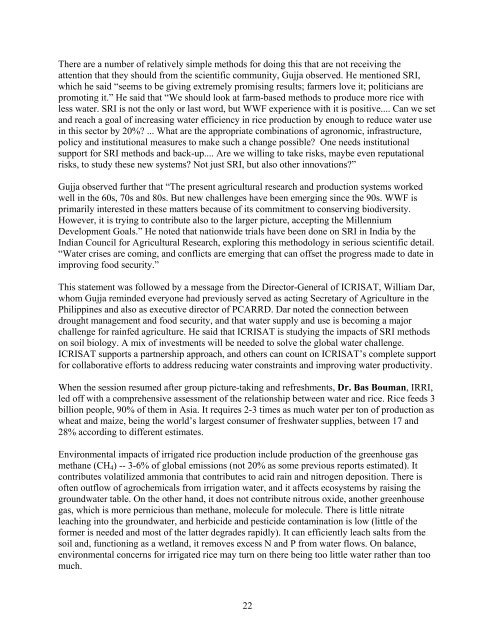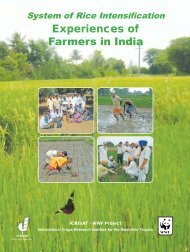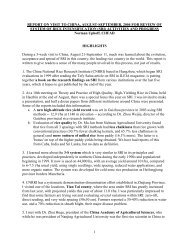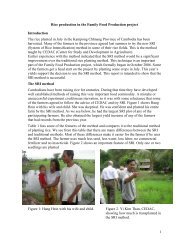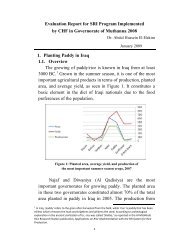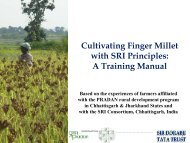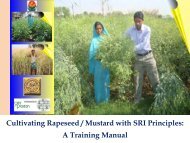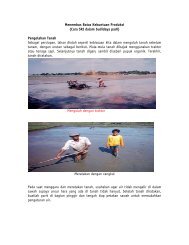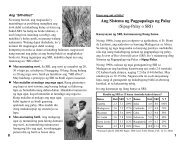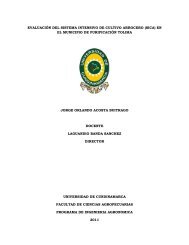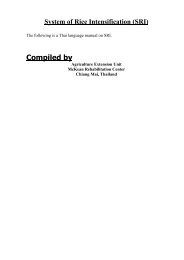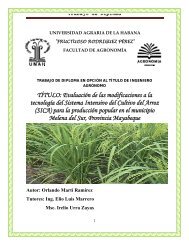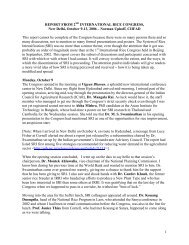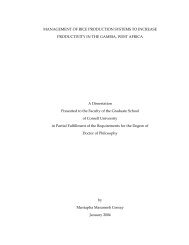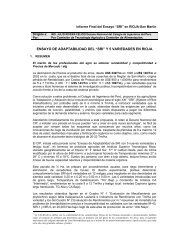report on a visit to the philippines to review sri progress
report on a visit to the philippines to review sri progress
report on a visit to the philippines to review sri progress
Create successful ePaper yourself
Turn your PDF publications into a flip-book with our unique Google optimized e-Paper software.
There are a number of relatively simple methods for doing this that are not receiving <strong>the</strong><br />
attenti<strong>on</strong> that <strong>the</strong>y should from <strong>the</strong> scientific community, Gujja observed. He menti<strong>on</strong>ed SRI,<br />
which he said “seems <strong>to</strong> be giving extremely promising results; farmers love it; politicians are<br />
promoting it.” He said that “We should look at farm-based methods <strong>to</strong> produce more rice with<br />
less water. SRI is not <strong>the</strong> <strong>on</strong>ly or last word, but WWF experience with it is positive.... Can we set<br />
and reach a goal of increasing water efficiency in rice producti<strong>on</strong> by enough <strong>to</strong> reduce water use<br />
in this sec<strong>to</strong>r by 20%? ... What are <strong>the</strong> appropriate combinati<strong>on</strong>s of agr<strong>on</strong>omic, infrastructure,<br />
policy and instituti<strong>on</strong>al measures <strong>to</strong> make such a change possible? One needs instituti<strong>on</strong>al<br />
support for SRI methods and back-up.... Are we willing <strong>to</strong> take risks, maybe even reputati<strong>on</strong>al<br />
risks, <strong>to</strong> study <strong>the</strong>se new systems? Not just SRI, but also o<strong>the</strong>r innovati<strong>on</strong>s?”<br />
Gujja observed fur<strong>the</strong>r that “The present agricultural research and producti<strong>on</strong> systems worked<br />
well in <strong>the</strong> 60s, 70s and 80s. But new challenges have been emerging since <strong>the</strong> 90s. WWF is<br />
primarily interested in <strong>the</strong>se matters because of its commitment <strong>to</strong> c<strong>on</strong>serving biodiversity.<br />
However, it is trying <strong>to</strong> c<strong>on</strong>tribute also <strong>to</strong> <strong>the</strong> larger picture, accepting <strong>the</strong> Millennium<br />
Development Goals.” He noted that nati<strong>on</strong>wide trials have been d<strong>on</strong>e <strong>on</strong> SRI in India by <strong>the</strong><br />
Indian Council for Agricultural Research, exploring this methodology in serious scientific detail.<br />
“Water crises are coming, and c<strong>on</strong>flicts are emerging that can offset <strong>the</strong> <strong>progress</strong> made <strong>to</strong> date in<br />
improving food security.”<br />
This statement was followed by a message from <strong>the</strong> Direc<strong>to</strong>r-General of ICRISAT, William Dar,<br />
whom Gujja reminded every<strong>on</strong>e had previously served as acting Secretary of Agriculture in <strong>the</strong><br />
Philippines and also as executive direc<strong>to</strong>r of PCARRD. Dar noted <strong>the</strong> c<strong>on</strong>necti<strong>on</strong> between<br />
drought management and food security, and that water supply and use is becoming a major<br />
challenge for rainfed agriculture. He said that ICRISAT is studying <strong>the</strong> impacts of SRI methods<br />
<strong>on</strong> soil biology. A mix of investments will be needed <strong>to</strong> solve <strong>the</strong> global water challenge.<br />
ICRISAT supports a partnership approach, and o<strong>the</strong>rs can count <strong>on</strong> ICRISAT’s complete support<br />
for collaborative efforts <strong>to</strong> address reducing water c<strong>on</strong>straints and improving water productivity.<br />
When <strong>the</strong> sessi<strong>on</strong> resumed after group picture-taking and refreshments, Dr. Bas Bouman, IRRI,<br />
led off with a comprehensive assessment of <strong>the</strong> relati<strong>on</strong>ship between water and rice. Rice feeds 3<br />
billi<strong>on</strong> people, 90% of <strong>the</strong>m in Asia. It requires 2-3 times as much water per t<strong>on</strong> of producti<strong>on</strong> as<br />
wheat and maize, being <strong>the</strong> world’s largest c<strong>on</strong>sumer of freshwater supplies, between 17 and<br />
28% according <strong>to</strong> different estimates.<br />
Envir<strong>on</strong>mental impacts of irrigated rice producti<strong>on</strong> include producti<strong>on</strong> of <strong>the</strong> greenhouse gas<br />
methane (CH4) -- 3-6% of global emissi<strong>on</strong>s (not 20% as some previous <str<strong>on</strong>g>report</str<strong>on</strong>g>s estimated). It<br />
c<strong>on</strong>tributes volatilized amm<strong>on</strong>ia that c<strong>on</strong>tributes <strong>to</strong> acid rain and nitrogen depositi<strong>on</strong>. There is<br />
often outflow of agrochemicals from irrigati<strong>on</strong> water, and it affects ecosystems by raising <strong>the</strong><br />
groundwater table. On <strong>the</strong> o<strong>the</strong>r hand, it does not c<strong>on</strong>tribute nitrous oxide, ano<strong>the</strong>r greenhouse<br />
gas, which is more pernicious than methane, molecule for molecule. There is little nitrate<br />
leaching in<strong>to</strong> <strong>the</strong> groundwater, and herbicide and pesticide c<strong>on</strong>taminati<strong>on</strong> is low (little of <strong>the</strong><br />
former is needed and most of <strong>the</strong> latter degrades rapidly). It can efficiently leach salts from <strong>the</strong><br />
soil and, functi<strong>on</strong>ing as a wetland, it removes excess N and P from water flows. On balance,<br />
envir<strong>on</strong>mental c<strong>on</strong>cerns for irrigated rice may turn <strong>on</strong> <strong>the</strong>re being <strong>to</strong>o little water ra<strong>the</strong>r than <strong>to</strong>o<br />
much.<br />
22


